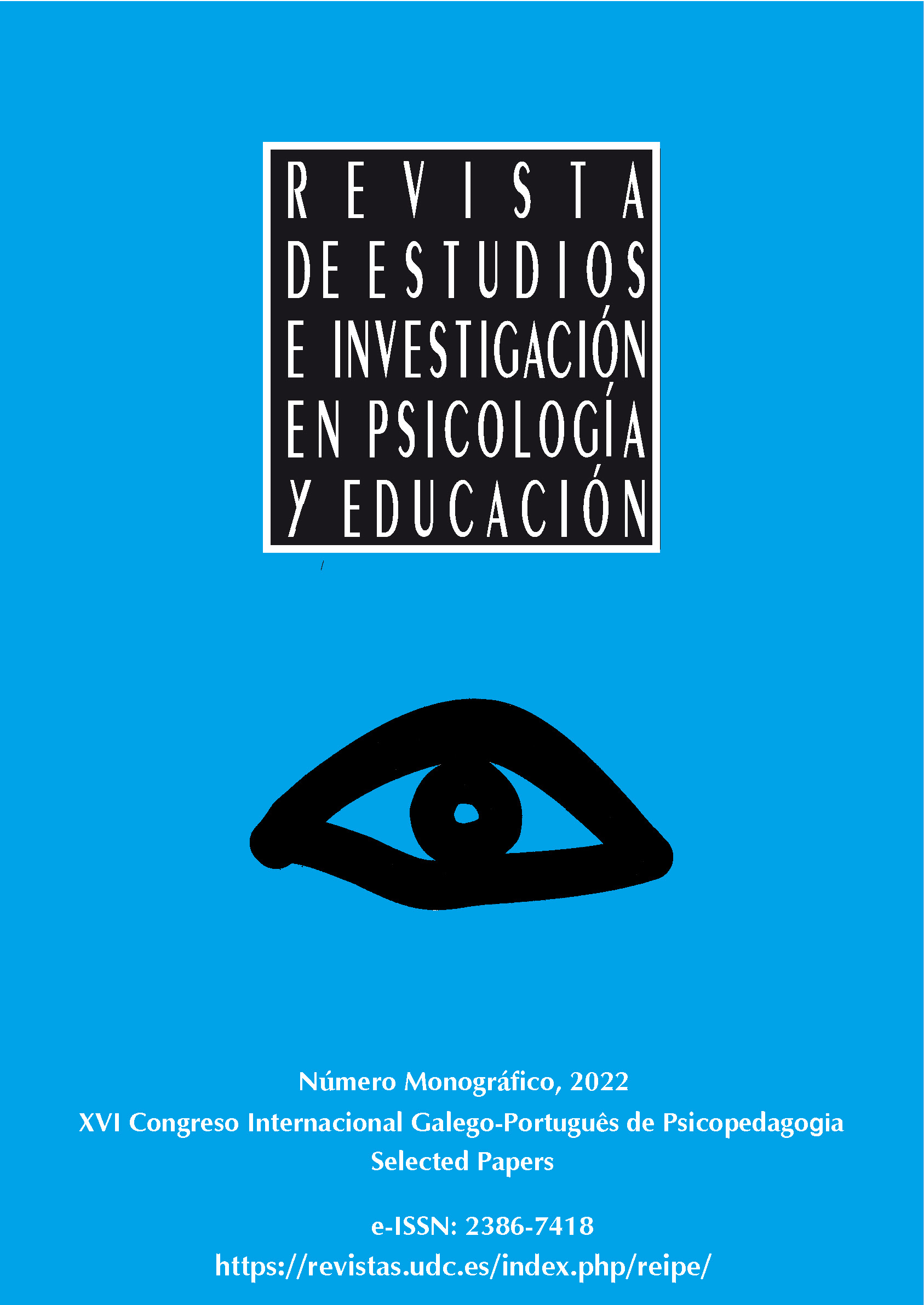Efeito das competências de literacia emergente na aprendizagem inicial da leitura
Contido principal do artigo
DOI:
https://doi.org/10.17979/reipe.2022.9.0.8902Resumo
Vários estudos têm sugerido que os conceitos acerca do impresso, os conhecimentos acerca da escrita, o reconhecimento de letras e a consciência fonológica são preditores da aprendizagem inicial da leitura. No entanto, são mais escassos os estudos que visam determinar em que medida estas variáveis permitem identificar com precisão os alunos em risco na aprendizagem inicial da leitura, sendo esta a questão visada neste estudo. A amostra foi constituída por 60 alunos do 1º ano de escolaridade, com idades compreendidas entre os 6 e os 8 anos. Os alunos foram avaliados no início do 1.º ano com provas que avaliavam os conceitos acerca do impresso, os conhecimentos acerca da escrita, o reconhecimento de letras e a consciência fonológica. No final do ano foi-lhes administrada uma prova de leitura de palavras. Os resultados da análise de regressão logística indicaram que as variáveis em estudo não predizem o risco de dificuldades na leitura no final do 1.º ano de escolaridade. Todavia, a análise de curvas ROC sugeriu uma precisão razoável na identificação de alunos em risco na aprendizagem da leitura, tendo por base o desempenho em consciência fonológica.
Palavras-chave:
Agências:
Downloads
Detalles do artigo
Referências
Albuquerque, C. P., Simões, M., & Martins, C. (2011). Testes de consciência fonológica da Bateria de Avaliação Neuropsicológica de Coimbra: Estudos de precisão e validade. RIPED - Revista Iberoamericana de Psicología de Ejercicio y Del Deporte, 1(29), 51–76.
Anderson, K. L., Atkinson, T. S., Swaggerty, E. A., & O’Brien, K. (2019). Examining relationships between home-based shared book reading practices and children’s language/literacy skills at kindergarten entry. Early Child Development and Care, 189(13), 2167–2182. https://doi.org/10.1080/03004430.2018.1443921
Campos, M. M., Bhering, E. B., Esposito, Y., Gimenes, N., Abuchaim, B., Valle, R., & Unbehaum, S. (2011). A contribuição da educação infantil de qualidade e seus impactos no início do ensino fundamental. Educação e Pesquisa, 37(1), 15–33. https://doi.org/10.1590/S1517-97022011000100002
Cardoso, A. M., & Balça, Â. (2017). Conceções de leitura e escrita em crianças do pré-escolar. Educação, 40(3), 422–430. https://doi.org/10.15448/1981-2582.2017.3.25489
Chaves-Sousa, S., Ribeiro, I., Viana, F. L., Vale, A. P., Santos, S., & Cadime, I. (2017). Validity evidence of the Test of Word Reading for Portuguese elementary students. European Journal of Psychological Assessment, 33(6), 460–466. https://doi.org/10.1027/1015-5759/a000307
Cohen, J. (1992). A power primer. Psychological Bulletin, 112, 155–159. https://doi.org/10.1037/0033-2909.112.1.155
Compton, D. L., Fuchs, D., Fuchs, L. S., & Bryant, J. D. (2006). Selecting at-risk readers in first grade for early intervention: A two-year longitudinal study of decision rules and procedures. Journal of Educational Psychology, 98(2), 394–409. https://doi.org/10.1037/0022-0663.98.2.394
Deuschle, V. P., & Cechella, C. (2009). O déficit em consciência fonológica e sua relação com a dislexia: diagnóstico e intervenção. Revista CEFAC, 11(2), 194–200. https://doi.org/10.1590/S1516-18462008005000001
Erdoǧan, Ö. (2011). Relationship between the phonological awareness skills and writing skills of the first-year students at primary school. Kuram ve Uygulamada Egitim Bilimleri, 11(3), 1506–1510.
Figueira, A. P., & Botelho, A. R. (2017). Consciência fonológica e desempenho geral na leitura. Que relação? Estudo com alunos dos 2.o e 3.o anos de escolaridade. Práxis Educativa, 12(1), 1–16. https://doi.org/10.5212/PraxEduc.v.12i1.0003
Justi, C. N. G., Cunha, N., & Justi, F. R. R. (2020). Letter-name knowledge: Predicting reading and writing difficulties. Estudos de Psicologia (Campinas), 37, 1–14. https://doi.org/10.1590/1982-0275202037e180173
Lerner, M. D., & Lonigan, C. J. (2016). Bidirectional relations between phonological awareness and letter knowledge in preschool revisited: A growth curve analysis of the relation between two code-related skills. Journal of Experimental Child Psychology, 144, 166–183. https://doi.org/10.1016/j.jecp.2015.09.023
Meira, Â. (2017). Consciência fonológica. Do constructo à avaliação [Tese de Doutoramento, Universidade do Minho]. http://repositorium.sdum.uminho.pt/handle/1822/48627
Moreira, J. S. (2016). O valor preditivo da consciência fonológica e do reconhecimento de letras na aprendizagem da leitura: Um estudo longitudinal com alunos da educação pré-escolar até ao 3.o ano de escolaridade [Dissertação de Mestrado, Universidade de Lisboa]. http://hdl.handle.net/10451/27166
Olofsson, Å. (2000). Naming speed, phonological awareness and the initial stage of learning to read. Logopedics Phoniatrics Vocology, 25(1), 35–40. https://doi.org/10.1080/140154300750045894
Ouellette, G., & Sénéchal, M. (2017). Invented spelling in kindergarten as a predictor of reading and spelling in grade 1: A new pathway to literacy, or just the same road, less known? Developmental Psychology, 53(1), 77–88. https://doi.org/10.1037/dev0000179
Paulino, J. (2009). Consciência fonológica: Implicações na aprendizagem da leitura [Tese de Doutoramento, Universidade de Coimbra]. Coimbra.
Sigmundsson, H., Haga, M., Ofteland, G. S., & Solstad, T. (2020). Breaking the reading code: Letter knowledge when children break the reading code the first year in school. New Ideas in Psychology, 57(1), 1–7. https://doi.org/10.1016/j.newideapsych.2019.100756
Suehiro, A. C. B., & dos Santos, A. A. A. (2015). Compreensão de leitura e consciência fonológica: Evidências de validade de suas medidas. Estudos de Psicologia, 32(2), 201–212. https://doi.org/10.1590/0103-166X2015000200005
Teixeira, M. M. (1993). Comportamentos emergentes de leitura. Aspetos cognitivos e linguísticos [Tese de Doutoramento, Universidade do Minho]. Braga.
Vale, A. P. S. (2000). Escrita inventada. Um bom instrumento de previsão precoce dos desempenhos ulteriores em escrita no português. Revista Galego-Portuguesa de Psicoloxía e Educación, 6(6), 507–521.
Viana, F. L., Ribeiro, I., Vale, A. P., Chaves-Sousa, S., Santos, S., & Cadime, I. (2014). Teste de Leitura de Palavras. Manual Técnico. CEGOC.
Wasik, B. A., Bond, M. A., & Hindman, A. (2006). The effects of a language and literacy intervention on Head Start children and teachers. Journal of Educational Psychology, 98(1), 63–74. https://doi.org/10.1037/0022-0663.98.1.63



